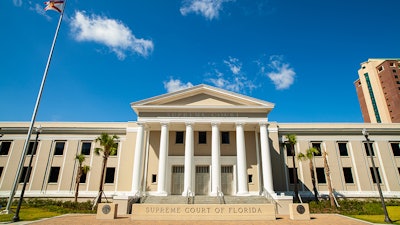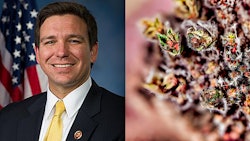
The Florida Supreme Court issued an order Oct. 3 for oral arguments to determine if an adult-use cannabis measure is fit to appear on the state’s November 2024 ballot.
The arguments for the case are scheduled for 9 a.m. Nov. 8, 2023, with a maximum of 20 minutes to each side allowed, but “counsel is expected to use only so much of that time as is necessary,” according to the order.
No continuances will be granted by the court, except upon showing of “extreme hardship,” the order states.
This notice comes more than two months since a series of briefs and reply briefs unfolded among Florida Attorney General Ashley Moody, who opposes the constitutional measure, the Smart & Safe Florida political action committee, which sponsors the measure, and various government entities and non-governmental organizations that have attempted to stake a claim in the matter.
Most recently, Moody argued that Tallahassee, Fla.-based multistate cannabis operator Trulieve, which represents the main financial muscle behind the ballot proposal with more than $39 million in contributions so far, has “invited millions of Floridians to join it in a reckless violation of federal criminal law” out of pursuit of a largest customer base and greater profits.
These comments were a part of Moody’s Aug. 2 reply brief filed in the Florida Supreme Court.
Moody, the state’s chief legal officer, originally submitted a 49-page brief June 26, urging the court’s justices to rule the legalization proposal unfit for the ballot in a four-part argument. She outlined why she believes the proposal does not live up to state standards requiring clear and unambiguous language in order to appear on the ballot.
Moody’s four points of argument include:
- The ballot summary misleadingly suggests that the amendment would “allow” recreational marijuana, when in fact the drug would remain criminal under federal law;
- The ballot summary misleadingly suggests that it would authorize “other state licensed entities” beyond [Medical Marijuana Treatment Centers] to cultivate and distribute marijuana;
- The ballot summary misleadingly suggests that the amendment “limits” the scope of the immunity for possession when it actually outright bans possession of more than 3 ounces; and
- The ballot summary fails to advise voters that the amendment would leave MMTCs unregulated with respect to recreational marijuana.
Specifically, the ballot summary includes provisions to: 1.) Allow adults 21 years and older to purchase, possess and use cannabis; 2.) Allow MMTCs and other licensed entities to operate in the program; and 3.) Establish possession limits for personal use.
In addition, the Florida Chamber of Commerce filed a brief challenging the proposal’s fitness based on a requirement to abide by the state’s single-subject rule, arguing that the initiative deals with the dual subjects of decriminalizing and commercializing adult-use cannabis.
In a reply brief filed roughly three weeks later (on July 19), legal representation on behalf of Smart & Safe Florida outlined three overarching arguments to suggest the 2024 initiative is sufficient to appear before voters, who would need to carry a 60% majority to pass the measure next November (since it’s a measure that would amend the state constitution):
- The ballot summary clearly and unambiguously discloses the amendment’s chief purpose and is not affirmatively misleading;
- The amendment embraces one subject: allowing adults 21 years or older to possess, purchase and use cannabis; and
- The proposed amendment does not violate the Supremacy Clause of the U.S. Constitution.
The attorneys working on behalf of Smart & Safe Florida—led by John F. Bash of Quinn Emanuel Urquhart & Sullivan LLP in Austin, Texas—who filed the brief wrote that Moody is attempting to change the rules of judicial review.
“In the past several years, this court has established a ‘roadmap’ for sponsors of marijuana-related ballot initiatives,” the attorneys wrote. “In drafting the initiative, SSF followed that clear roadmap. But the attorney general and other opponents now argue that this court should abruptly redraw the map.”
These remarks came after the Florida Supreme Court in 2021 killed a pair of a legalization attempts to land on the 2022 ballot (via 5-2 decisions), and with the authors of the 2024 initiative using simplicity as a guideline to land the current proposal on the 2024 ballot.
RELATED: Florida’s 2024 Cannabis Ballot Measure’s Secret is Simplicity
Still, rejection from the Supreme Court remains a threat. Four justices who ruled in the majority to keep the 2022 proposals off the ballot remain on the bench, three of whom were appointed by anti-legalization Gov. Ron DeSantis. And the two most recently seated justices also were appointed by DeSantis.
While political allegiance is not supposed to play a role in the judicial branch of government, it’s difficult to ignore this reality, especially given DeSantis’ far-leaning stance on the issue. Notably, DeSantis associated cannabis legalization with people “defecating on the sidewalk in broad daylight,” during a presidential campaign stop Aug. 26 in Iowa.
“The drugs are killing this country,” he said, responding to a question about whether he would support legalizing cannabis at the federal level.
“If you look in these places, like, I [went] to San Francisco, I don't know, a month or two ago, and I've been railing against San Francisco, because I read what's going on [there],” DeSantis said. “I hear people that come to Florida tell me why they moved from San Francisco to Florida. But then when you actually see it, you drive in, within five minutes I see somebody defecating on the sidewalk in broad daylight.”
DeSantis and Moody have rallied against Florida’s legalization efforts since taking office in 2019.

























